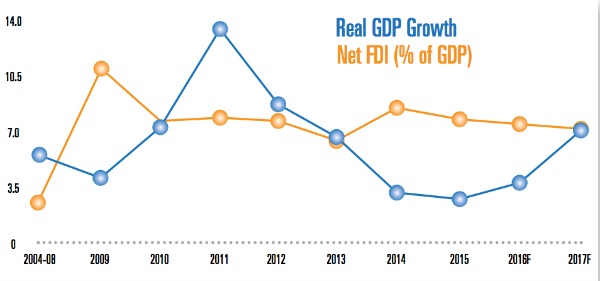Ghana is experiencing rapid population growth, as well as a growing middle class, second only to Nigeria. It enjoys an abundance of natural resources and an advanced banking system, plus a relatively diverse economy and stable government.
Residential Market
New housing developments have catered toward foreign and local workers interested in higher-end urban properties, primarily large apartment complexes funded by foreign investors. The 27-story Villaggio Vista in Accra is Ghana’s tallest building.
Commercial Market
Accra Mall, opened in 2008, is Africa’s frst modern shopping mall and attracts nearly four million visitors each year. Its success led to the development of the West Hills Mall, also in Accra, and Kumasi City Mall in Ghana’s second largest city. More neighborhood retail centers are needed.
Accra’s One Airport Square, a pristine example of sustainable building, is considered the most prestigious corporate address in Ghana. Several major mixed-use developments are at various stages, including Accra Financial Centre, The Octagon, and The Exchange.
Repeatedly stalled construction on Hope City, a $10 billion high-tech hub outside Accra, began in June 2016, with a three year completion date. The six connected buildings include a 75-story tower, which would be Africa’s tallest.
Infrastructure
Lack of reliable energy is the biggest infrastructure challenge in Ghana. The government’s efforts to more than double its power generation capacity have created major FDI opportunities. Roads are another top priority. In Ghana, road density is similar to China, but Ghana’s spending on its roads is substantially lower (1.5 percent of GDP versus 9 percent in China).









